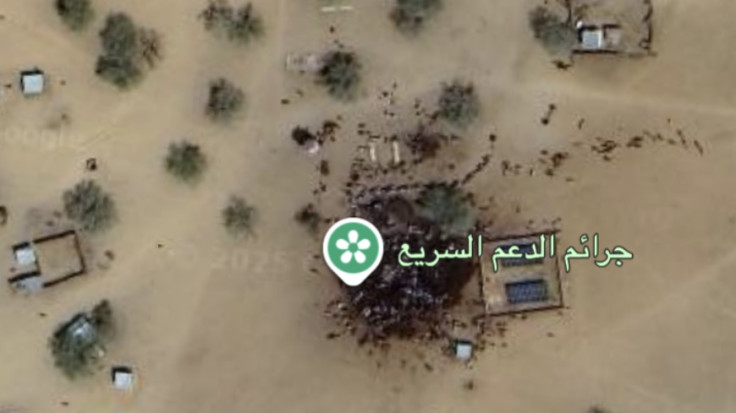What Is Happening in Sudan Right Now? Horror as Blood and Piles of Bodies Seen in Satellite Images

New satellite imagery from Sudan's Darfur region has exposed evidence of possible mass killings in the Sudanese city of El Fasher, where large pools of blood and clusters of bodies have been detected following the Rapid Support Forces (RSF) takeover.
Analysts warn that the atrocities, targeting non-Arab ethnic groups, may represent the worst violence seen in Darfur in decades.
According to a report in The Guardian, imagery of El Fasher shows large reddish stains on the sand and clusters of objects consistent with those of adult human bodies.
The siege of the city ended when the paramilitary RSF seized control following an 18-month blockade — an event that analysts say allowed the atrocities to unfold largely unobserved.
Mass Killings and Ethnic Cleansing Alleged
Analysis from The Guardian and the Yale University Humanitarian Research Lab (HRL) said at least 31 clusters of bodies were visible in satellite imagery, alongside extensive red-stained sand, interpreted as blood evidence. The HRL described it as 'the first time we've seen satellite imagery pick up blood stains on this scale.'
Witness reports suggest that RSF fighters carried out ethnically targeted executions against the Fur, Zaghawa, and Berti communities. The World Health Organisation (WHO) confirmed at least 460 people were killed at the Saudi-Maternity Hospital in El Fasher, including patients and family members. Humanitarian monitors fear the death toll is far higher, as many areas remain inaccessible.
A Humanitarian Collapse Unfolding
The war in Sudan, which erupted in April 2023, has now displaced more than 14 million people, creating the world's largest displacement crisis. Thousands have been killed, and millions more are struggling to access food, medicine, or communication.
With aid convoys blocked and infrastructure destroyed, civilians in El Fasher face starvation and disease. 'Every day is a fight to survive,' said one aid coordinator to Reuters. 'Families are hiding, desperate for news, while the outside world debates resolutions that never reach them.'
The United Nations warns that humanitarian access remains almost nonexistent in Darfur, where survivors are trapped under RSF control. Local witnesses describe mass graves and abandoned neighbourhoods where 'the silence is heavier than gunfire.'
Global Reaction and Calls for Action
Despite mounting documentation of atrocities, the international response has been muted. The UN Security Council condemned the violence but stopped short of imposing new sanctions or deploying peacekeepers. Human-rights groups, including Human Rights Watch and Amnesty International, are urging stronger measures — from arms embargoes to targeted sanctions against RSF leaders.
'Satellite evidence leaves no doubt that mass killing is taking place,' said a spokesperson for Amnesty. 'The world cannot claim ignorance this time.'
Diplomatic experts say Sudan risks a territorial split, with RSF forces now controlling nearly all major cities in Darfur, while the Sudanese Armed Forces hold parts of the northeast.
What Lies Ahead for Sudan
With El Fasher under RSF control, many fear the civil war could solidify Sudan's division into rival states. For civilians, the city's fall represents not just military defeat but the loss of safety and identity.
Despite mounting evidence and the pleas of survivors, the world's response has been hesitant at best. The Security Council's statement condemning atrocities brings little comfort to terrified families waiting for help that never comes.
For many Sudanese, it feels like history is repeating itself—Darfur's horrors, once headline news, now risk being forgotten all over again. The world may watch these events unfold through satellite images, but these cannot capture the fear and plight of those experiencing the suffering from the violence on the ground.
Human rights organisations are urging the world to do more—enforce arms embargoes, sanction RSF leaders, and open safe routes so that the civilians can escape and immediate aid can reach those in need.
© Copyright IBTimes 2025. All rights reserved.





















